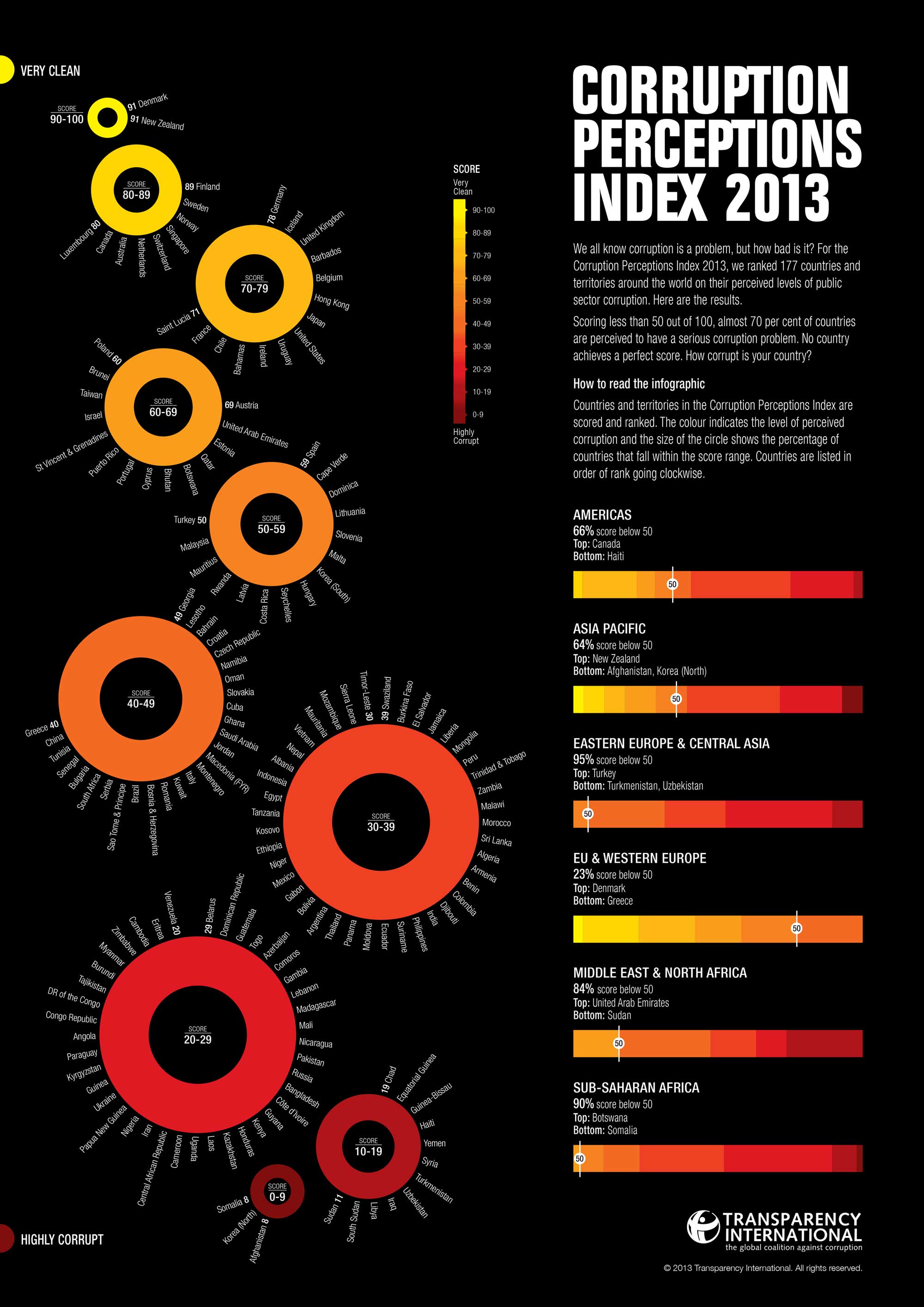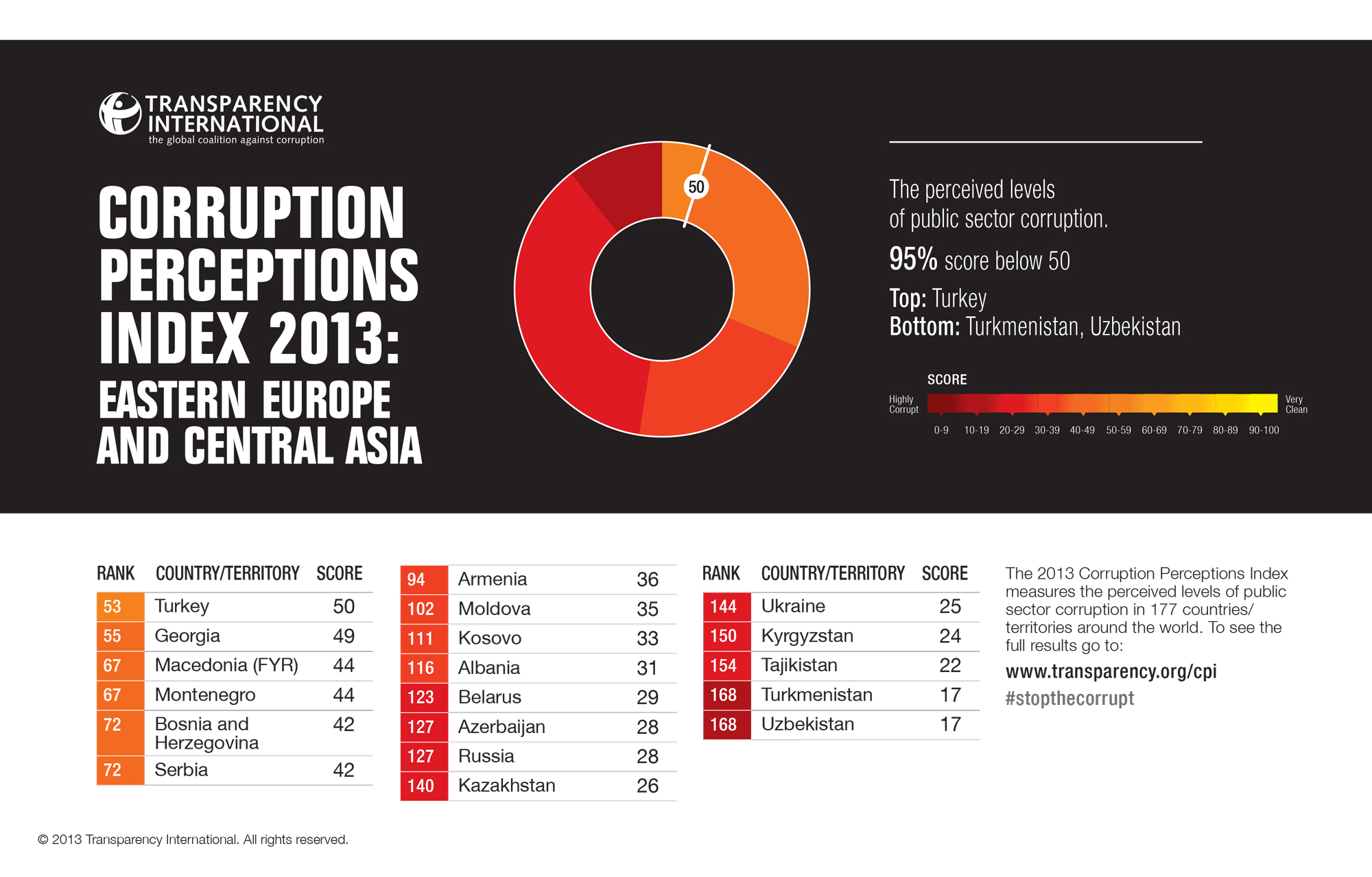

Total corruption kills honest business in Ukraine
The results of a new Corruption Perceptions Index 2013 (CPI) of Transparency International show the following: the conditions for conducting long-term business in Ukraine have been significantly deteriorated. The basic reasons are corrupt protectionism and fusion of political and business interests.
According to this year survey of Corruption Perceptions Index (CPI) the Ukrainian rating of the corruption level has remained practically unchanged – 25 points of 100. Thus, Ukraine was ranked 144 among 177 countries, covered by the survey. Ukraine is confident in the group of “high risk” together with Cameroon, Iran, Nigeria, Central African Republic and Papua New Guinea, but it risks slipping even lower in the next year.
According to the indexes of doing business in the country Ukraine is rapidly losing positions and it is a wake-up call. So, in the general aggregated corruption rating of CPI Ukraine has “sunk” on 10 points according to the parameter of political and financial corruption (part of CPI is taken from the survey data of Political Risk Services International Country Risk Guide).The indexes of excessive selective protection and suspiciously close ties between politics and business are taken into account in this survey. State institutions and officials often demand from business pay bribes as it is evidences by the fall of the corresponding rating of Ukraine on 5 points (part of CPI is taken from the data of World Economic Forum Executive Opinion Survey).
Ukrainian and foreign business is ready to sound the alarm, because the basic problems of business community are not only solved but exacerbated. The basic are the following:
- Business monopolization. Oligarchic clans actively redistribute business resources between themselves and displace transparency and healthy competitiveness from the market;
- Failure of long-term business planning. In Ukraine the property becomes less secure, the single and unchanging rules of conducting business cease to act for all market participants;
- Occupation of the business by the state corrupters. The procedures of receiving permits to conduct business become more corrupt, corruption is flourishing in cooperation with the state authorities, officials, who takes decisions, take control of financial flows.
“Non-signing the agreement on association between Ukraine and EU is a banal evidence of fear of oligarchic business groups to transparent competitiveness. Ukrainian monopolists are unable to conduct business under the world standards. That is why they choose the familiar mechanisms of cooperation with corrupted neighbors”, – says Oleksii Khmara, an Executive director of Transparency International Ukraine.
Non-governmental anticorruption organizations led by Transparency International Ukraine urge the government not to sink Ukraine in the abyss of corruption and recommend the following steps:
- To ensure the compliance with the current legislation and immutability of rules of conducting business for all market participants regardless of the place of registration and sphere of activity;
- To prevent the merger of political and business interests. State authorities cannot function as business departments of oligarchic family groups;
- To renew the publication of the results in public procurement by the state enterprises, because it is the biggest part of public funds (about 350 billion UAH), which is distributed without any procedures and information. The corresponding norm is envisaged by the draft law No. 3522, submitted by the opposition and authorities to meet the requirements of visa liberalization with the EU;
- To make a public “black list of corrupt officials” as a list of business companies – participants of tender collusions with time prohibition of their participation in procurement;
- To prohibit participation of relatives and other persons related to officials in the tenders;
- To secure inevitability for corrupt actions.
Note: CPI is based on the independent surveys with participation of the international financial and human rights experts, including from Asian and African banks of development, World Bank and international organization Freedom House. The Index is the assessment from 0 (very corrupt) to 100 (very clean). More than two thirds from 177 states covered by CPI in 2013 received less than 50 points at the scale from 0 (very corrupt) to 100 (very clean). According to the data of CPI 2013 the first place share Denmark and New Zealand, each of these countries has received 91 points from 100. Afghanistan, North Korea and Somali have demonstrated the worst results this year and received 8 points each.
Full survey is available at: http://cpi.transparency.org/cpi2013/
Political Risk Services International Country Risk Guide
The rating is issued monthly starting from 1980. It describes political, economic and financial risks in the countries, important for the international business. Now the rating covers 140 countries and is the basis for systems of earlier warning on possibilities and danger for international business in each surveying country.
TI used the following data from this survey:
Assessment of corruption level in the political system. The most common form of corruption, with which business meets, is financial corruption as the requirements of “additional payments” and bribes in the process of receiving licenses to import and export, passage of foreign exchange control, payment of tax deductions, police protection or work with credits etc. The survey draws the special attention to the current and potential corruption as excessive selective protection, nepotism, commodity circulation, opaque financing parties and suspicious close ties between politics and business.
World Economic Forum Executive Opinion Survey (EOS)
Executive Opinion Survey (ЕОS) is the annual survey of the World economic forum of business executives. The survey was developing over time to cover new data necessary for the Growth Competitiveness Index (GCI) and other indicators of the Forum. Transparency International uses the answers of the respondents and the following questions from this survey:
(On a scale from 1-7, where 1 means often, and 7 – never)
1. «How often in your country do firms pay additional funds and bribes related to the following:
- import and export;
- public utilities companies;
- annual tax payments;
- awarding state agreements and licenses;
- receiving favorable judicial decisions.
2. “How often in your country do public finances flow through corrupt actions to the pockets of companies, organized groups or separate officials.


#
| Contact person: Olga Tymchenko,
Communications Department Head Transparency International Ukraine mob. 050-352-96-18, phone 044 360-52-42, e-mail: [email protected] м.т. 050-352-96-18, р.т. 044 -52-42, e-mail: [email protected] www.ti-ukraine.org |
Note: Transparency International Ukraine if the representative office of the global anticorruption nongovernmental organization Transparency International which have more than 90 national representative chapters and works in more than 100 countries of the world. Mission of TI Ukraine is to limit the increasing the corruption level in Ukraine by promoting transparency, accountability and integrity of public authorities and civil society. You can learn more detailed information at: www.ti-ukraine.org. |






